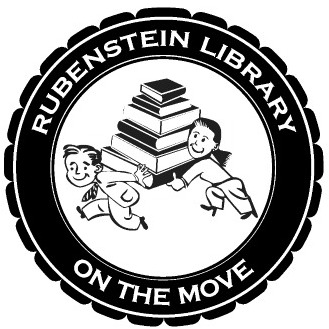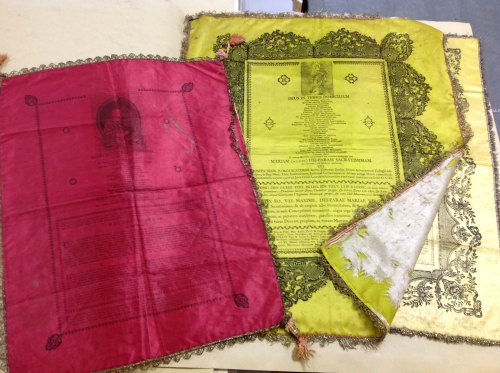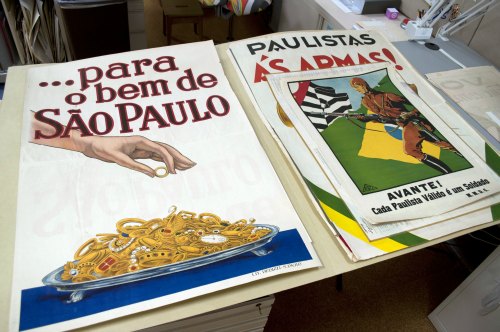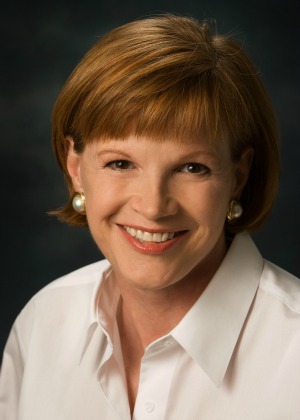 After all the talk, it’s time to walk the walk: our library is now closed to researchers until January 7, 2013, as we relocate staff offices and begin shifting materials to our new space on the 3rd floor of Perkins Library. Check out the Renovation webpage for more information, and stay tuned for photos of our progress!
After all the talk, it’s time to walk the walk: our library is now closed to researchers until January 7, 2013, as we relocate staff offices and begin shifting materials to our new space on the 3rd floor of Perkins Library. Check out the Renovation webpage for more information, and stay tuned for photos of our progress!
Category Archives: News and Features
Conserving the Broadside Collection
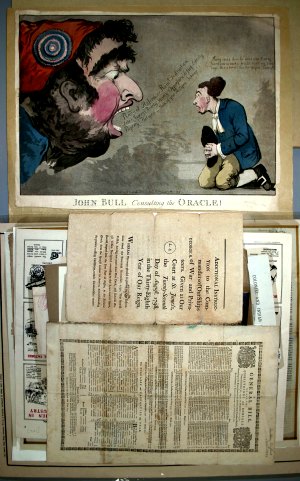 Conservation is nearing the end of a project that we have been working on since 2009, the broadside collection. In addition to broadsides, this collection includes thousands of posters, handbills, maps, diplomas, and a variety of paper ephemera. We in the conservation department have been coordinating with the Digital Production Center (DPC) to enable the safe handling of these materials during digitization.
Conservation is nearing the end of a project that we have been working on since 2009, the broadside collection. In addition to broadsides, this collection includes thousands of posters, handbills, maps, diplomas, and a variety of paper ephemera. We in the conservation department have been coordinating with the Digital Production Center (DPC) to enable the safe handling of these materials during digitization.
Many of the broadsides come to us encapsulated in Mylar that has been sealed with sticky tape. The items must be removed from the encapsulation prior to digitization, and this step also gives us the chance to repair damage that might grow worse with handling during digitization. Many of the broadsides are extremely brittle, and so there are often tears to mend.
The items are organized in folders by state or country, and it is always a surprise to open a folder and see what’s inside. So many of the items are historically fascinating and visually beautiful! To the right is a folder from Britain containing government notices and a caricature print from 1798.
The British folder also contained some much later posters from World War II (below).
This folder of items from Brazil contained broadsides from the Constitutionalist Revolution of 1932.
Also included in this batch of broadsides were highly elaborate diplomas, some on silk with embroidery and some with wax seals and ribbons.
It’s been fun treating such beautiful and fascinating items. Take a closer look at them all in the newly digitized Broadsides and Ephemera Collection!
To see more about this project (including a video), check out our posts at Preservation Underground:
http://blogs.library.duke.edu/preservation/2011/02/19/building-the-broadside-digital-collection/
http://blogs.library.duke.edu/preservation/2010/07/09/heres-your-mule/
http://blogs.library.duke.edu/preservation/2012/04/20/1091-project-digitization-and-conservation/
Post contributed by Grace White, Conservator for Special Collections, as part of our ongoing “In the Conservation Lab” series.
A Snapshot from Study Hall
Thanks to all of the students who came to the Rare Book Room for our special study hall yesterday! We hope the golden light and monumental tomes inspired you. And don’t forget to grab a cookie or two at tonight’s study break in the Perkins lobby!
Photo by Kate Collins, Research Services Librarian.
Study Like It’s 1799
Date: Monday, December 10th, 2012
Time: 1:00 PM to 12:00 AM
Location: Rare Book Room suite
Contact Information: Amy McDonald, amy.mcdonald(at)duke.edu
Need we remind you, dear busy students, that next Monday is the final Reading Day before exams begin? The Rubenstein Library is convening a very special study hall to help relieve at least the stress of finding a library studying space (you’re on your own for your chemistry final).
We’ll be opening the Biddle Rare Book Room’s double doors promptly at 1:00 PM and leaving them open until midnight. You’ll be able to read over your notes on our comfy couches, review your flashcards next to the Audubons, and finish up your final paper under the History of Medicine Collection’s ever-watchful glass eyeballs. The rooms were designed to look like the library of an 18th century English manor house, so yeah . . . study like it’s 1799. With wi-fi!
And it’s your chance to say “so long” to the Rare Book Room suite before it closes for renovation on December 17th. (Wondering what renovations will take place in the Rare Book Room suite? Check out our Rubenstein Renovation FAQ!) Rubenstein Library staff will also be around to answer questions about the renovation and what research at the Rubenstein Library will look like over the next few years.
Space will be available on a first-come, first-served basis, and no food or drink will be permitted (there ARE still rare books in the room’s bookcases, after all).
There might even be a pop quiz . . . .
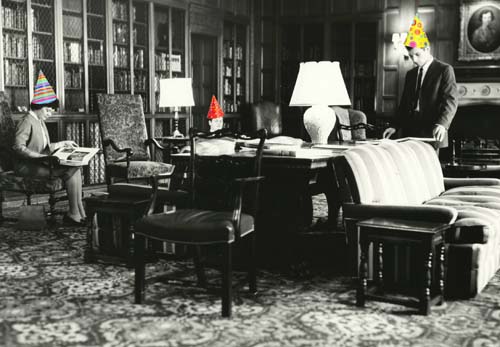
Rubenstein Library Moving December 17th – January 6th
Over the past year we’ve enveloped our books, trayed our books, used lots of post-it notes, and found many interesting things in the stacks, and now it’s time for us to get moving!
Between December 17th, 2012 and January 6th 2013 we will be closed while we relocate our workspaces and collections to our new space. We will reopen to the public on January 7, 2013 in our new temporary reading room: the third floor of Perkins Library!
Staff will have been relocated by January 7th, but our collections will be moving until February 17th, 2013. Access to collections and reference services will be limited while we finish moving them.
If you’re planning a research trip we strongly encourage you to come after February 17th. If you just can’t wait and need to come between January 7, 2013 and February 17, 2013, please contact us at least four days before your visit so we can make sure we have the material you want to use.
We’ll miss you while we’re closed, but we’re excited to have you visit us in our new home! If you have any questions about our move or the library renovation in general check out our Information for Researchers and Visitors and our Renovation FAQ, and if you still have lingering questions let us know.
Researching an Important Duke Milestone
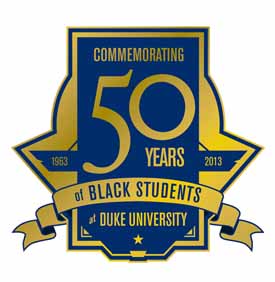 In 2013, Duke will mark 50 years since the desegregation of the undergraduate student body. The campus-wide theme, “Celebrating the Past, Charting the Future: Commemorating 50 Years of Black Students at Duke University” will be woven into annual events, like commencement, reunion, and Founder’s Day, and will also be a topic of reflection through exhibits, speakers, and service opportunities. Working together across the University, this milestone year offers all of us the opportunity to learn more about Duke’s history.
In 2013, Duke will mark 50 years since the desegregation of the undergraduate student body. The campus-wide theme, “Celebrating the Past, Charting the Future: Commemorating 50 Years of Black Students at Duke University” will be woven into annual events, like commencement, reunion, and Founder’s Day, and will also be a topic of reflection through exhibits, speakers, and service opportunities. Working together across the University, this milestone year offers all of us the opportunity to learn more about Duke’s history.
The University Archives has a rich photographic collection, and we have added a number of photos on Flickr as part of the anniversary celebration. They show us moments of protest and performance, as well as celebration. The photographs are featured on a new website dedicated to this fiftieth anniversary commemoration.
The University Archives contains many collections that provide historical context and primary source documentation on the desegregation of the school, the black student experience at Duke, and much more. Interested in diving in? A new guide to conducting research on African-American history at Duke is now available, and the UA staff is glad to consult on particular questions or projects. (Contact us here!)
Post contributed by Val Gillispie, University Archivist.
Gary Monroe on The Highwaymen
Date: Thursday, November 15, 2012
Time: 6:00 PM, reception to follow
Location: Biddle Rare Book Room
Contact Information: Kirston Johnson, kirston.johnson(at)duke.edu
Please join the staff of the Archive of Documentary Arts next Thursday, November 15 for a talk with documentary photographer Gary Monroe.
In the late 1950s in rural Florida, a group of young, self-taught African-American artists began to paint optimistic and colorful Florida landscapes. They periodically left their backyard studios and took to the highway to sell their works to white customers, earning the name The Highwaymen. Their glowing images represented the American dream. Photographer Gary Monroe got to know these artists and will speak about their work and their legacy.
About Gary Monroe: Gary Monroe is a professor of art at the Southeast Center for Photographic Studies in Daytona Beach and author of The Highwaymen: Florida’s African-American Landscape Painters.
Post contributed by Kirston Johnson, Curator of the Archive of Documentary Arts.
What’s that Ringing in Perkins Library?
Shortly after Duke’s football win over the University of North Carolina on October 20th, the Duke University Libraries’ Communications and Development Departments and the Duke University Archives had an idea: why not bring the Victory Bell to Perkins Library? The University Archives has tons of historical material about Duke’s football team and the Victory Bell—including the bell’s original clapper, “liberated” from a UNC gymnasium in 1964—and, well, how much fun would it be to ring a bell in a quiet library?
After a few phone calls to our friends in Duke Athletics, the Victory Bell’s cart rolled over to Perkins Library this past Friday morning. Here are a few pictures from what proved to be a very fun—and occasionally very noisy—day. And, no, even though we’re librarians, we didn’t shush any of our bell ringers!
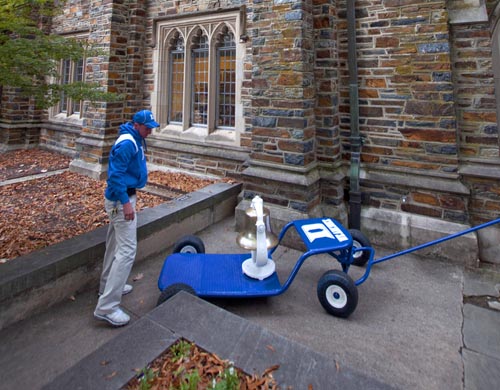
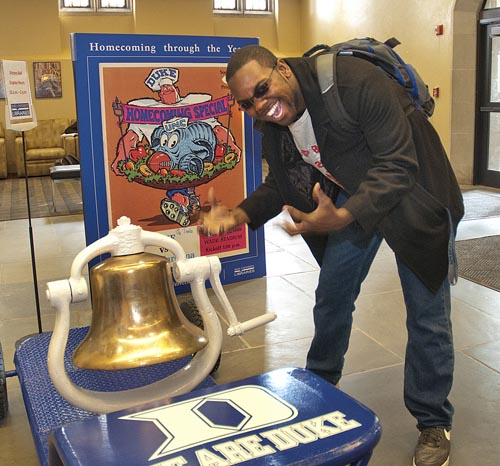
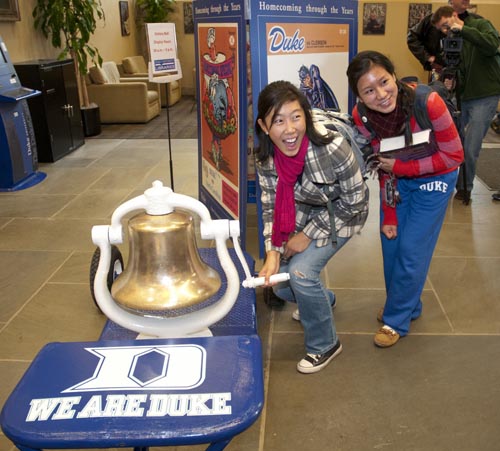
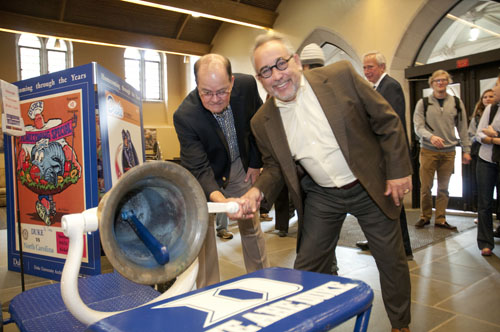
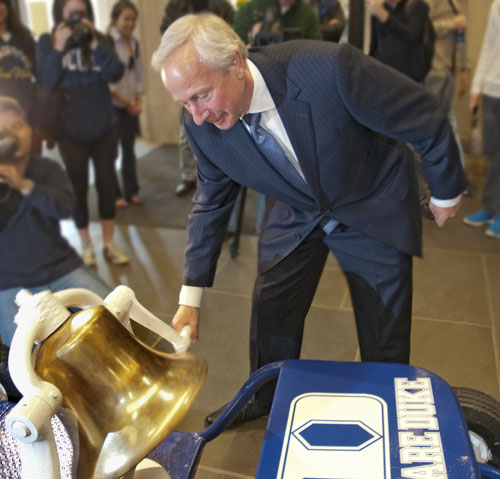
So what do you think, Coach Cutcliffe? Shall we do this again next year?
Check out more photos of the bell’s visit on Flickr. You’ll also find more photos at Duke Today’s story about the bell’s visit.
The Spiritual is Political
With generous assistance from a 2012 Mary Lily Research Grant, I visited the Sallie Bingham Center for Women’s History and Culture this past summer to conduct research for my dissertation, “The Spiritual is Political: How the Southern Baptist Convention Debated Feminism and Found the New Right.”
I focused primarily on records in the Resource Center for Women in Ministry in the South collection. The Resource Center was founded by Jeanette Stokes in 1977 to provide support for women who were in ministerial leadership roles. Its extensive archival records at Duke University include back issues of its publication, “South of the Garden,” materials from its annual “Women in Ministry in North Carolina” conferences, and the newsletters and paraphernalia of affiliated religious organizations.
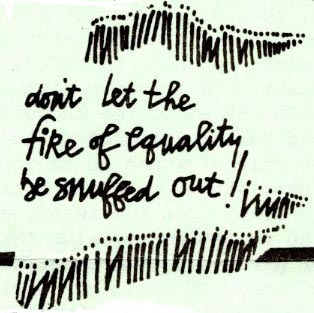
In my examination of the Resource Center files, I came across an interesting collection of newsletters for Southern Baptists in North Carolina who supported feminism in the 1970s and 1980s. These newsletters were produced by “Southern Baptists for the Family and Equal Rights,” or SBFER, an organization formed in 1981 to create support for the Equal Rights Amendment and issues related to women’s health and welfare in the North Carolina Baptist Convention and in state politics.SBFER was short-lived, lasting less than five years. Though it failed to attract considerable support in the national denomination, it enjoyed limited success as a local organization. After its efforts to promote the ERA in the state were unsuccessful and the deadline for ERA ratification came and went, the organization turned its focus to women’s ordination and other expressions of feminism in the Southern Baptist Convention. After 1985, however, the organization began to decline as it became clear that the denomination was not returning to a moderate course.The SBFER’s newsletters are crucial for my dissertation as they provide evidence of grassroots feminism within the Southern Baptist Convention at a time when the denomination was reversing course on many issues regarding gender equality, in full retreat from moderate positions it had taken in the 1970s. These materials from the early 1980s reveal strong dissenting views, which complicate the narrative of the Southern Baptist Convention’s right turn on social issues. SBFER aimed to throw a wrench in the plans of the denomination’s new conservative leaders. And while they were unable to stop the Southern Baptist Convention from aligning itself with the Religious Right, they did succeed in keeping women’s issues part of denominational dialogue in the 1980s.
Post contributed by Laura J. Foxworth, Ph.D. candidate, University of South Carolina, Department of History.
Nancy Fletcher on Outdoor Advertising
Date: Thursday, November 8, 2012
Time: 5:00 PM reception, 6:00 PM talk
Location: Gothic Reading Room, Perkins Library
Contact information: Jacqueline Reid Wachholz, 919-660-5836 or j.reid(at)duke.edu.
The John W. Hartman Center for Sales, Advertising & Marketing History at Duke University celebrates its 20th Anniversary in 2012 with a lecture series of advertising luminaries. Please join us next Thursday for the fourth talk in the series.
Nancy Fletcher, CEO of the Outdoor Advertising Association of America (OAAA) will talk about Outdoor Advertising: Unified Vision. Bold Future. Outdoor advertising is one of the oldest forms of media in existence, dating back to the circus posters of the 1800’s. Since those early days, outdoor advertising has constantly evolved to adapt to new markets, formats, technology, and opportunities. Please join us and take another look at one of the fastest-growing advertising media around. The event is free and open to the public. For more information, visit the lecture series website.
This 20th Anniversary Lecture Series event is sponsored by the Duke University Office of the Provost, Fuqua School of Business, Trinity College of Arts & Sciences, Markets & Management Studies, Duke Marketing Club, NCOAA, SCOAA, Fairway Outdoor Advertising, and Adams Outdoor.
Post contributed by Jacqueline Reid Wachholz, Director of the John W. Hartman Center for Sales, Advertising, and Marketing History.


